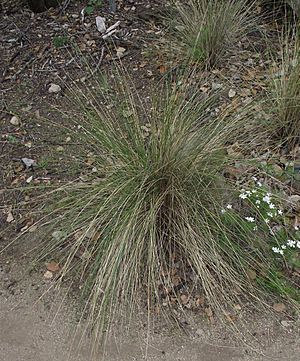Stipa speciosa facts for kids
Quick facts for kids Stipa speciosa |
|
|---|---|
 |
|
| Scientific classification | |
| Kingdom: | |
| (unranked): | |
| (unranked): | |
| (unranked): | |
| Order: | |
| Family: | |
| Genus: | |
| Species: |
S. speciosa
|
| Binomial name | |
| Stipa speciosa (Trin. & Rupr.) Barkworth
|
|
| Synonyms | |
|
Achnatherum speciosum |
|
Stipa speciosa is a type of grass often called desert needlegrass. It is found in dry areas, especially where sagebrush grows. You can find it in the southwestern United States, from California to Colorado. It also grows in Mexico and parts of South America.
What it Looks Like
Desert needlegrass is a short plant that grows in clumps. It can reach a height of about 1 to 2 feet (30 to 60 cm). Its leaves are very thin, less than a millimeter wide. The edges of the leaves are often rolled up.
The bottom parts of the leaves are stiff. They stay on the plant even after the grass dries out. The plant's flower part, called an inflorescence, is about 2 inches (5 cm) long. It looks dense and fluffy.
Seeds and How They Spread
Each tiny flower part, called a spikelet, is very hairy. It has a bent, hair-covered part called an awn. This awn can be up to about a centimeter long.
The stiff awn and sharp tip of the spikelet help the seeds. The hairs on the seed help it stick to animal fur. This allows animals to carry the seeds to new places. The hairs also help the seeds float on the wind for dispersal. When the awn gets wet, it twists. This twisting helps the seed bury itself into the soil.

